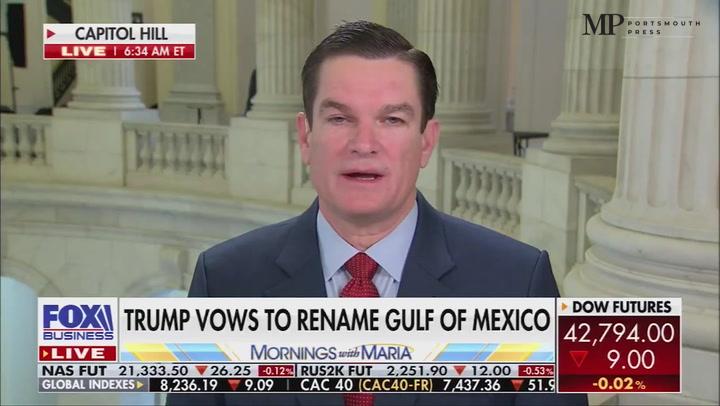The calm waters of the Gulf of Mexico turned stormy this week after former President Donald Trump suggested a bold name change. He proposed renaming it the ‘Gulf of America,’ igniting a lively debate not just in the United States but also across the border in Mexico. This conversation reflects deeper cultural and political nuances, highlighting the fascinating exchanges between the two neighboring countries.
Trump’s Plan and Its Political Fallout
During a recent speech, Trump announced his intention to officially rename the Gulf of Mexico. This proposal was met with mixed feelings. While some, like Representative Austin Scott from Georgia, have already adopted the new name, emphasizing it during discussions about regional law enforcement, many others are voicing their concerns.
- Scott is a member of the House Armed Services Committee.
- His comments marked the first public endorsement of Trump’s proposal.
- He stated that the change could re-establish a sense of ownership and pride in the region.
- However, Scott underlined that focusing on law enforcement and safety should take precedence over such name changes.
Mexico’s President Sheinbaum Responds
In what many found to be a humorous yet pointed rebuttal, Mexican President Claudia Sheinbaum took to social media to address Trump’s comments. Instead of taking the proposal lying down, she suggested a name change of her own, implying perhaps that North America should be referred to as ‘Mexican America’ instead. This clever jab highlights the complex diplomatic relationship between the U.S. and Mexico, showing how humor can sometimes be a powerful diplomatic tool.
- Sheinbaum remarked on the historical context, mentioning that the name ‘Gulf of Mexico’ has been in use since 1607.
- Her response not only called attention to the absurdity of the suggestion but also pointed out the realities of how the names people give places hold significant meaning.
- The lightheartedness of Sheinbaum’s counterproposal reflects her desire to maintain a strong yet humorous stance against Trump’s initiative.
The Historical Significance of Names
The name ‘Gulf of Mexico’ has deep historical roots. It is not merely a geographic label but a reflection of the rich culture and history of the region. This discussion about renaming touches on broader themes of identity and heritage for both the US and Mexico. Names can evoke feelings of belonging and pride, making the renaming proposition a critical issue far beyond just semantics.
For many, the Gulf is associated with family vacations, fishing stories, and beautiful sunsets over the water. Any change to its name can stir up strong emotions, raising questions about who owns the narrative of the places we love.
A Broader Diplomatic Dialogue
This exchange between Trump and Sheinbaum also reveals the diverging styles of leadership in the U.S. and Mexico. While Trump often employs direct and abrupt methods, Sheinbaum leans toward diplomacy laced with humor. Her approach highlights how diplomacy can take many forms, from stern warnings to light-hearted banter. In the backdrop of trade talks and immigration policies, both leaders have their work cut out for them as they navigate existing tensions.
What’s Next for the Gulf?
As discussions continue, the future of the Gulf remains in play, with many wondering what will happen next. Trump is expected to make a formal announcement regarding the proposed name change, but it will likely face pushback not only from Mexican officials but also from communities along the Gulf Coast who feel a strong attachment to its existing name.
The Gulf of America? Or will it stay the Gulf of Mexico? Only time will tell what name will stick, but one thing is for sure: the conversation offers a rich tapestry of beliefs about identity, pride, and the importance of naming in our world.
| Event | Description |
|---|---|
| Trump’s Proposal | Renaming the Gulf of Mexico to Gulf of America |
| Sheinbaum’s Response | Suggests North America be called ‘Mexican America’ |
| Public Reaction | Mixed feelings; significant discussions on identity |









